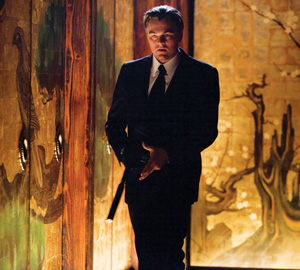ACCORDING to box-office-films.com, of the Top 100 films of 2010 (as of Dec. 15),18 were sequels and 13 were remakes, spinoffs or adaptations of other media.
I present these figures for educational purposes only. They suggest, though, that if you went to see one of the Top 100 films, you had approximately a one-third chance of seeing something you’d seen before.
Heavy in 2010: the theme of uncertainty and descent into dream wonderlands; Alice herself (interpreted by Tim Burton) is the subject of the No. 2 film of the year.
Often what was offered in 2010 wasn’t just escapism but absolute solipsism: that is, the denial that there really was such a thing as an outside world. “We’ll be living on the Internet,” enthuses Sean Parker in The Social Network, as if that weren’t just possible but desirable.
Leonardo DiCaprio, yesterday’s beloved romantic lead, is today’s confused dream weaver, with two roles as a widower who has left reality—first as a castaway in the Caligarian Shutter Island; second as the suave dream date in Inception.
Inception suggests that the ultimate human connections—between wife and husband, between father and son—are all just fantasies waiting to be gamed by engineers.
Even the grittier indie cinema kept us on shaky ground. The random-access drama Blue Valentine shuttles around in time between past and present. Blue Valentine asks, who is this couple: a pretty, hard-working student and her would-be boyfriend, a good-looking hipster—or a pair of ruined recession casualties living on the edge of town? In scrambling up the time frame, Blue Valentine says, “Both at once.”
Even one of the most abjectly crowd-pleasing films on my Top 10 list, True Grit, takes pleasure in aliases. It is one surprise to find more of the sound and sense of Shakespeare in The King’s Speech than in Julie Taymor’s adaptation of The Tempest. It is another to discover more of the heft of Shakespeare in this Western than there is in Taymor’s own island of fantasy, disguise and impersonation. The elaborate vocabulary of the searchers is one of True Grit‘s main pleasures.
All the West’s a stage: Matt Damon’s Laboeuf is a buckskin-clad pose-striker and a declaimer. The Coens aren’t the first filmmakers to think of the West as a place of confidence men and noms de plains, well aware of the legends they’ll leave behind.
True Grit, however, is just one 2010 film raising the question of how one can disappear into a new life. Catfish and Exit Through the Gift Shop demonstrate how a false front can be slapped up fast.
The pose of the artist is the easiest to adopt and the hardest to expose—this would seem to be some of the text in the roundly overpraised Tiny Furniture, in which we note the elevated social status of out-and-out charlatans: the YouTube sensation who sits on his rocking horse and mangles Nietzsche; the sous chef who gets a name as an intellectual, not through the intelligent way in which he conducts himself but because of what he’s been rumored to be reading.
So, consider “Mr. Brain Wash,” the popular if egregious artist in Exit Through the Gift Shop. He may (it’s suspected) be a sock puppet of the courageous Banksy. But does “MBW” have to be Banksy? Who do you have to be to make bad art?
Such is the lesson in the documentary Catfish, when we learn the true identity behind a Facebook avatar, a pretty girl. Supposedly, she’s a wizard of the lively and the plastic arts. (“Is there nothing you can’t do?” exclaims her victim.)
Pat Tillman’s afterlife, seen in the documentary The Tillman Story, shows how the State Department played identity games with a casualty of Afghanistan. Tillman’s bravery and intelligence could have made this country better. Instead, craven opportunists smelted him into a war monument.
Some thought of Toy Story 3 as sheer cuteness: a simply understood, funny adventure. But children watch it and face their terrors of abandonment. Adults watch it and face their terrors of obsolescence, of being sent to a home when they age. On one hand, Toy Story 3 is a rousing adventure about slave labor and escape; on the other, it’s a metaphorical tale of caring parents who must be cared for themselves some day.
And then the year brought us the sumptuous I Am Love, with Tilda Swinton torn between the role of an unmarried lover or the respectable mother of a well-off family.
Because it’s the wrong medium, I can’t include on this list the electrifying season four of Mad Men; the continuing adventures of damaged Don Draper, hiding under the mask of a father and husband. Instead, the spot goes to Fish Tank, a British movie about a too-young girl of the projects, convincing herself that she’s old enough to be a lover.
Such was 2010 in film, a year of poses, of characters guessing where they stood, and wondering if the realm of reality offered them enough to make it worth their while to stay.
There were also fantasies of insane brutality; sometimes delightfully grisly, as in the uproarious Machete, or the indefensible yet lovable Jackass 3D. The fantasies were sometimes infantile in a different way. Sometimes they were love stories taking places in scuff-proofed, friction-free Manhattans and Los Angeleses that could only have been manufactured by CGI—as in the New York in the arguably worst of 2010, The Back Up Plan, where every billboard, every building, every passerby, advertises the idea of having a baby.
These and other films were diversions from the year’s main themes of uncertainty, of slippery grasps on the real world: films sold to a crowd wondering whether they woke up or slept.
RvB’s Top 10
The Social Network
Toy Story 3
Blue Valentine
True Grit
Fish Tank
Exit Through the Gift Shop
The Tillman Story
I Am Love
Inception
Catfish
Runners-up: Carlos, Winter’s Bone, The Kids Are Alright




